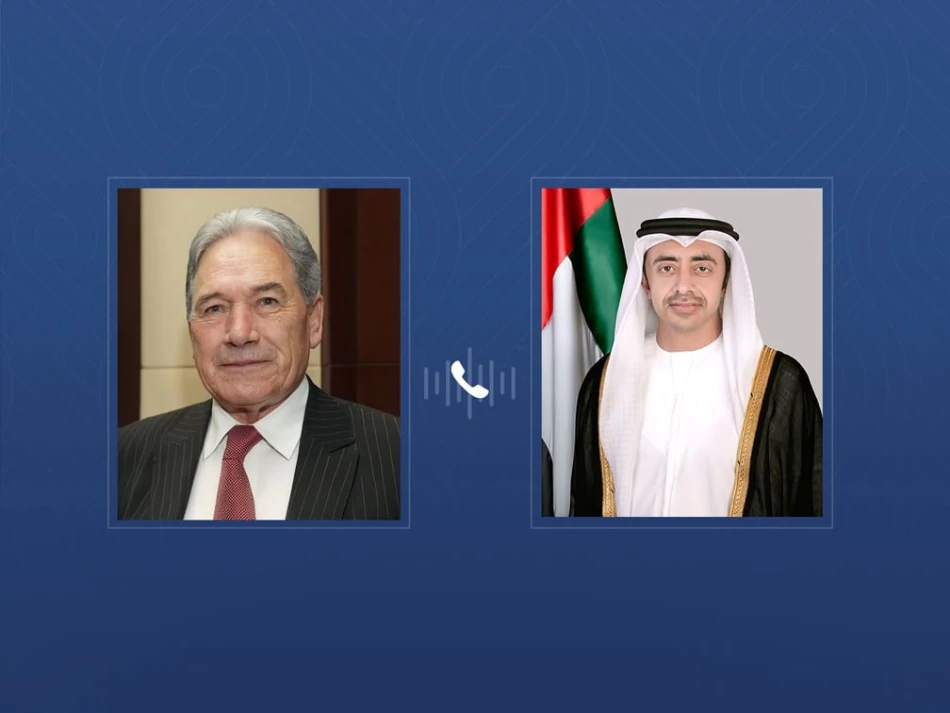
Abdullah bin Zayed and New Zealand FM Discuss Strengthening Bilateral Ties
UAE and New Zealand Strengthen Diplomatic Ties Amid Regional Turbulence
The UAE and New Zealand are deepening their bilateral relationship through high-level diplomatic engagement, as both nations seek to diversify partnerships beyond traditional allies. A recent phone call between UAE Foreign Minister Sheikh Abdullah bin Zayed Al Nahyan and New Zealand Foreign Minister Winston Peters signals growing cooperation between the Gulf state and the Pacific nation, particularly as global trade patterns shift and regional tensions mount.
Strategic Partnership Takes Shape
During their telephone discussion, Sheikh Abdullah bin Zayed, who also serves as Deputy Prime Minister, and Peters explored opportunities for enhanced cooperation across multiple sectors identified as development priorities for both countries. The conversation underscored what UAE officials described as the "depth of relations" between the two nations and their mutual commitment to capitalizing on available opportunities for growth.
This diplomatic outreach reflects the UAE's broader strategy of building relationships with middle-power nations that can serve as stable partners in an increasingly multipolar world. New Zealand, with its strong agricultural sector, clean energy initiatives, and strategic Pacific location, offers the UAE opportunities to diversify both its economic partnerships and diplomatic influence.
Economic Complementarity Drives Engagement
Trade and Investment Potential
The timing of this diplomatic engagement is significant for several reasons. The UAE has been actively seeking to reduce its economic dependence on traditional markets, while New Zealand faces pressure to diversify its trade relationships beyond China and Australia. Both countries have demonstrated strong post-pandemic economic recovery, making them attractive partners for expanded trade and investment.
New Zealand's expertise in sustainable agriculture and renewable energy aligns well with the UAE's food security initiatives and clean energy transition goals. Meanwhile, the UAE's position as a regional financial hub and its growing technology sector could provide New Zealand businesses with enhanced access to Middle Eastern and South Asian markets.
Regional Context Matters
The ministers also discussed regional and international developments, exchanging views on current geopolitical situations. This aspect of their conversation likely covered Middle Eastern tensions, Pacific security concerns, and the broader implications of shifting global alliances.
For New Zealand, strengthening ties with the UAE offers a pathway to greater engagement with the Middle East without the complications that come with relationships involving larger regional powers. The UAE's relatively stable political environment and pragmatic foreign policy approach make it an ideal partner for New Zealand's traditionally neutral diplomatic stance.
Broader Implications for Regional Diplomacy
This UAE-New Zealand engagement fits within a larger pattern of middle-power diplomacy that has gained momentum in recent years. Similar to how the UAE has cultivated relationships with countries like Singapore, South Korea, and Israel, this outreach to New Zealand demonstrates Abu Dhabi's commitment to building a diverse network of partnerships that can weather regional storms.
The emphasis on "development priorities" suggests both countries are looking beyond traditional diplomatic cooperation toward concrete economic and technological partnerships. This pragmatic approach has proven successful for the UAE in other relationships and could serve as a model for New Zealand's own efforts to maintain economic growth while navigating complex geopolitical currents.
The strengthening UAE-New Zealand relationship represents more than routine diplomatic courtesy—it signals both nations' recognition that future prosperity may depend less on traditional alliances and more on flexible partnerships with reliable, like-minded countries across different regions.
Most Viewed News

 Sara Khaled
Sara Khaled






